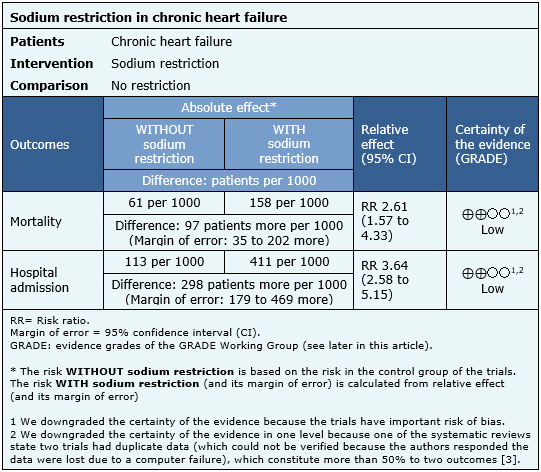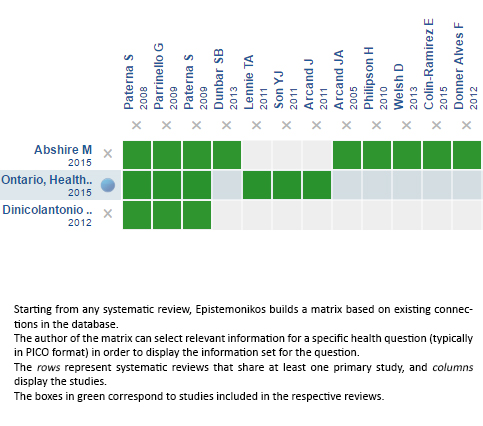Resúmenes Epistemonikos
← vista completaPublicado el 5 de diciembre de 2016 | http://doi.org/10.5867/medwave.2016.6696
¿Se debe restringir el consumo de sodio en la insuficiencia cardíaca crónica?
Should sodium intake be restricted in chronic heart failure?
Abstract
Sodium restriction has been recommended in chronic heart failure for decades. However, the evidence about the benefit of this measure is not clear, and it might even increase risks.
Searching in Epistemonikos database, which is maintained by screening multiple databases, we identified three systematic reviews incorporating 13 studies addressing the question of this article, 10 were randomized trials. We extracted data, combined the evidence using meta-analysis and generated a summary of findings table following the GRADE approach. We concluded sodium restriction might increase mortality and the risk of hospital admission in chronic heart failure, but the certainty of the evidence is low.
Problem
High sodium intake increases morbidity and mortality, mainly in hypertensive people. Sodium restriction has also been recommended in chronic heart failure for decades, to diminish edema and to improve symptoms. However, it has been also postulated sodium restriction might increase the activity of renin-angiotensin and sympathetic systems through intravascular depletion, specially when combined with fluid restriction and diuretic therapy. Even though guidelines widely support this measure, existing evidence is controversial.
Methods
We used Epistemonikos database, which is maintained by screening multiple databases, to identify systematic reviews and their included primary studies. We extracted the information from the reviews, and with this information we generated a structured summary using a pre-established format, which includes key messages, a summary of the body of evidence (presented as an evidence matrix in Epistemonikos), meta-analysis of the total of studies, a summary of findings table following the GRADE approach and a table of other considerations for decision-making.
|
Key messages
|
About the body of evidence for this question
|
What is the evidence. |
We found three systematic reviews [1],[2],[3] incorporating 13 primary studies overall [4],[5],[6],[7],[8],[9],[10],[11],[12],[13],[14],[15],[16], including 10 randomized controlled trials [4],[5],[6],[7],[8],[9],[10],[11],[12],[13]. This table and the summary in general are based on the latter. |
|
What types of patients were included |
Ejection fraction was 22.5% in one trial [8], <35% in three trials [4],[5],[6], < 40% in one trial [13] and in five it was not reported [10],[12],[13],[14],[15]. NYHA functional class of included patients was the following: In three trials it was II at 30 days post-discharge [4],[5],[6]; in one trial 72.6% were class II and 11.7% class III [7]; in one trial 17% class II and 83% class III [9]; in one 48.1 % II, 51.9% III or IV [10]; in one 90% II and 10% III [11]; in one I-III [12]; in one 24% II, 74% III [13]; and in one it was not reported [8]. |
|
What types of interventions were included |
Three trials compared furosemide po + 120 mmol sodium per day versus furosemide po + 80 mmol sodium per day [4],[5],[6]. One trial compared providing general information versus providing information for a 2500 mg per day restriction [7]. Another trial compared a prescription of sodium 2000 mg per day versus 2000 mg per day + education by nutritionist [8]. One trial compared providing general information versus sodium restriction (2000-3000 mg/day and liquid 1.5 L + education) [9]. One trial compared provision of information + general care versus diet, education and sodium restriction 2000-3000mg per day [10]. One trial compared a restriction of 2300 versus 1500 mg per day [11]. One trial compared usual care versus diet, education and sodium restriction 2000-3000 mg per day [12]. Another trial compared provision of information about salt and fluid intake restriction versus fluid restriction 1500 cc per day and 5000 mg sodium per day restriction + nutritional support [13]. |
|
What types of outcomes |
The primary studies measured several outcomes, but the systematic reviews identified grouped them as follows:
|
Summary of findings
The information about the effects of sodium restriction in chronic heart failure is based on only three trials including 775 patients for the outcome mortality and 578 for hospital admission [7],[8],[9]. The remaining trials were not incorporated in the meta-analysis of any of the reviews identified.
The summary of findings is the following:
- Sodium restriction might increase mortality in chronic heart failure, but the certainty of the evidence is low.
- Sodium restriction might increase the risk of hospital admission in chronic heart failure, but the certainty of the evidence is low.


Other considerations for decision-making
|
To whom this evidence does and does not apply |
|
| About the outcomes included in this summary |
|
| Balance between benefits and risks, and certainty of the evidence |
|
| What would patients and their doctors think about this intervention |
|
| Resource considerations |
|
|
Differences between this summary and other sources |
|
| Could this evidence change in the future? |
|
How we conducted this summary
Using automated and collaborative means, we compiled all the relevant evidence for the question of interest and we present it as a matrix of evidence.

Follow the link to access the interactive version: Sodium restriction in chronic heart failure
Notes
The upper portion of the matrix of evidence will display a warning of “new evidence” if new systematic reviews are published after the publication of this summary. Even though the project considers the periodical update of these summaries, users are invited to comment in Medwave or to contact the authors through email if they find new evidence and the summary should be updated earlier. After creating an account in Epistemonikos, users will be able to save the matrixes and to receive automated notifications any time new evidence potentially relevant for the question appears.
The details about the methods used to produce these summaries are described here http://dx.doi.org/10.5867/medwave.2014.06.5997.
Epistemonikos foundation is a non-for-profit organization aiming to bring information closer to health decision-makers with technology. Its main development is Epistemonikos database (www.epistemonikos.org).
These summaries follow a rigorous process of internal peer review.
Conflicts of interest
The authors do not have relevant interests to declare.

